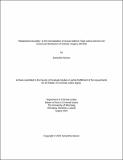“Weaponized sexuality” to the normalization of sexual violence: Rape culture and the non-consensual distribution of intimate imagery (NCDII)
Metadata
Afficher la notice complèteAuthor
Hanson, Samantha
Date
2022-08-22Citation
Hanson, Samantha. “Weaponized sexuality” to the normalization of sexual violence: Rape culture and the nonconsensual distribution of intimate imagery (NCDII); A thesis submitted to the Faculty of Graduate Studies in partial fulfillment of the requirements for the ... Master of Arts in Criminal Justice, The University of Winnipeg. Winnipeg, Manitoba, Canada: University of Winnipeg, August 2022. DOI: 10.36939/ir.202208251629.
Abstract
This thesis research explores the non-consensual distribution of intimate imagery (NCDII), a form of technology-facilitated sexual violence. NCDII is the digital sharing of sexualized visual content of another person, without the consent of the individual depicted. This research responds to four research driven questions: 1) What is the prevalence of NCDII?; 2) What are the contextual circumstances where sexual content is captured and distributed without someone’s consent?; 3) What are the outcomes and consequences experienced by those who have been directly subject to NCDII? and; 4) What are individuals’ general perspectives and understanding about NCDII? The current research argues NCDII is best explained and understood through the existence, and persistence, of rape culture. The findings demonstrate NCDII is a common act that has become normalized, and expected, among young people. Motivations to share non-consensual content of others range from amusement to retribution, while victims/survivors are blamed for their involvement, and held responsible for not adequately mitigating the risks both prescribed, and encouraged, by misogynistic social structures. This research discusses both the existence, and persistence, of digital rape myths and ideal victimhood, though also finds basic forms of consent are recognized by young people. This research has potential for information to be used in intervention solutions which could include cultural and educational messaging.

